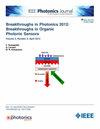Ultraviolet-Enhanced Flat Supercontinuum Light Generated in Cascaded Photonic Crystal Fiber
IF 2.1
4区 工程技术
Q3 ENGINEERING, ELECTRICAL & ELECTRONIC
引用次数: 0
Abstract
We demonstrate that by using a cascaded configuration of five solid-core photonic crystal fiber (PCF) samples with progressively decreasing core diameters, ultraviolet light with wavelengths as short as ∼300 nm can be generated in a supercontinuum (SC) set-up. With a nanosecond laser as the pump light, the modulation instability effect leads to the generation of multiple optical solitons in the first PCF sample which has a close-to-zero dispersion value at the pump wavelength (∼1064 nm). The following PCF samples with decreasing core diameters enhance the waveguide nonlinearity, and at the same time provide continuously-shorter phase-matching wavelengths for dispersive-wave emission, thereby pushing the short-wavelength edge of the SC spectrum into the deep ultraviolet spectral region. While the PCF splicing technique ensures the compactness of this SC set-up, the generated SC spectrum, spanning ∼350 nm to ∼2000 nm with a flat spectral profile, may be applied in fluorescence microscopy and biochemical imaging.级联光子晶体光纤中产生的紫外线增强型扁平超连续光
我们的研究表明,通过使用纤芯直径逐渐减小的五个固芯光子晶体光纤(PCF)样品级联配置,可以在超连续(SC)装置中产生波长短至 ∼300 nm 的紫外线。用纳秒激光作为泵浦光,调制不稳定性效应导致在第一个 PCF 样品中产生多个光孤子,该样品在泵浦波长(∼1064 nm)处的色散值接近于零。随后的 PCF 样品的芯直径不断减小,从而增强了波导的非线性,同时为色散波发射提供了更短的相位匹配波长,从而将 SC 光谱的短波长边缘推向深紫外光谱区。PCF 拼接技术确保了这种 SC 装置的紧凑性,同时产生的 SC 光谱跨越 350 纳米到 2000 纳米,光谱轮廓平坦,可用于荧光显微镜和生化成像。
本文章由计算机程序翻译,如有差异,请以英文原文为准。
求助全文
约1分钟内获得全文
求助全文
来源期刊

IEEE Photonics Journal
ENGINEERING, ELECTRICAL & ELECTRONIC-OPTICS
CiteScore
4.50
自引率
8.30%
发文量
489
审稿时长
1.4 months
期刊介绍:
Breakthroughs in the generation of light and in its control and utilization have given rise to the field of Photonics, a rapidly expanding area of science and technology with major technological and economic impact. Photonics integrates quantum electronics and optics to accelerate progress in the generation of novel photon sources and in their utilization in emerging applications at the micro and nano scales spanning from the far-infrared/THz to the x-ray region of the electromagnetic spectrum. IEEE Photonics Journal is an online-only journal dedicated to the rapid disclosure of top-quality peer-reviewed research at the forefront of all areas of photonics. Contributions addressing issues ranging from fundamental understanding to emerging technologies and applications are within the scope of the Journal. The Journal includes topics in: Photon sources from far infrared to X-rays, Photonics materials and engineered photonic structures, Integrated optics and optoelectronic, Ultrafast, attosecond, high field and short wavelength photonics, Biophotonics, including DNA photonics, Nanophotonics, Magnetophotonics, Fundamentals of light propagation and interaction; nonlinear effects, Optical data storage, Fiber optics and optical communications devices, systems, and technologies, Micro Opto Electro Mechanical Systems (MOEMS), Microwave photonics, Optical Sensors.
 求助内容:
求助内容: 应助结果提醒方式:
应助结果提醒方式:


